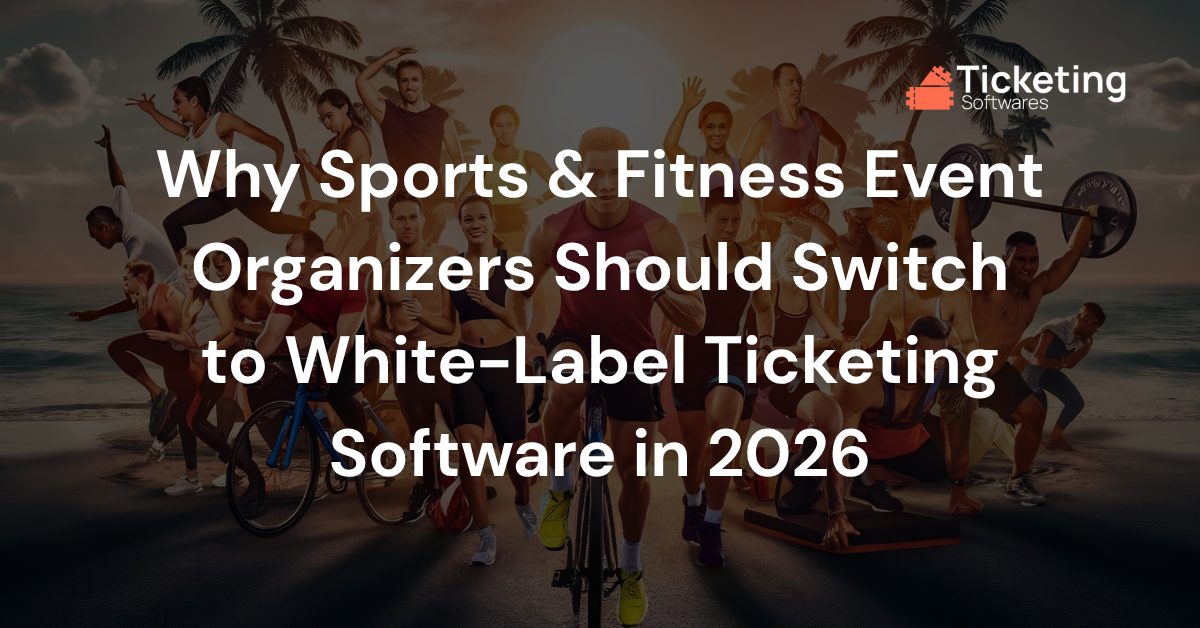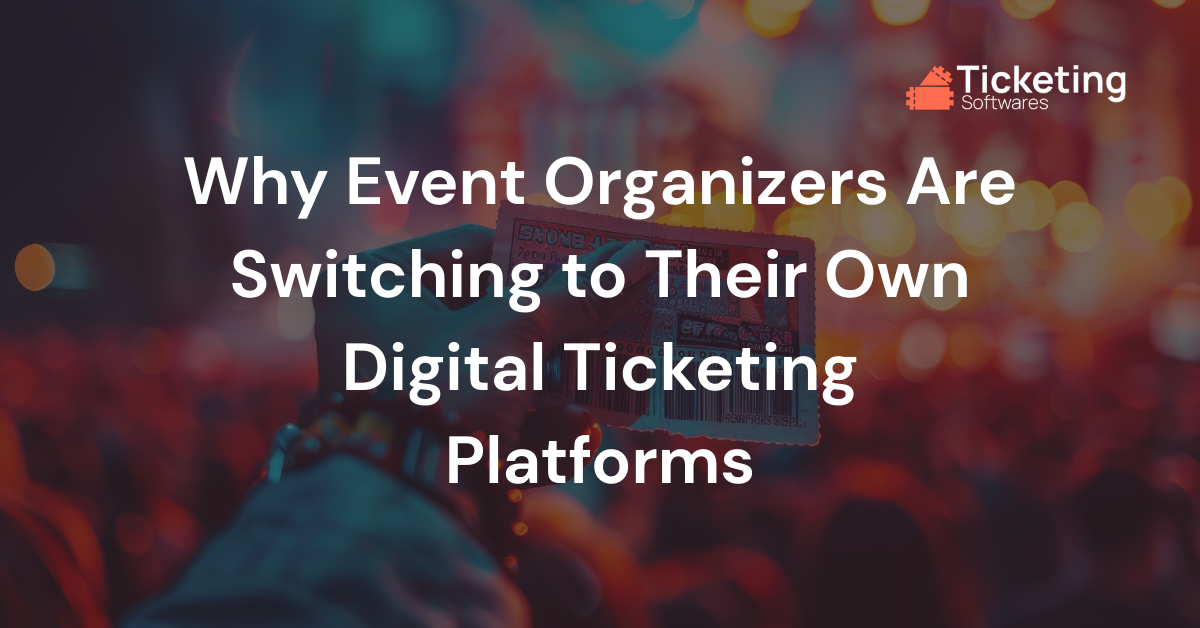Why Sports & Fitness Event Organizers Should Switch to White-Label Ticketing Software 2026

Sports and fitness events are growing rapidly across the world. From marathons, cycling races, bodybuilding expos, and CrossFit competitions to yoga festivals, sports tournaments, and fitness workshops organizers rely heavily on digital ticketing to manage registrations. The ticketing system is the first point of interaction between the participant and the event, which means it has a direct impact on trust, conversions, revenue, and the overall experience.
Yet, many organizers continue using third-party ticketing platforms that charge high commissions, control participant data, and place their own branding in front of the organizer’s brand. This leads to unnecessary costs and lost opportunities.
White-label event ticketing software is changing this landscape. Instead of sending participants to an external ticketing website, organizers can offer registration under their own brand, website, and system. This shift offers several long-term advantages that are especially important in the sports and fitness industry.
Brand Control and a Seamless Athlete Experience
Branding matters much more in sports and fitness events than in many other industries. Athletes and fitness enthusiasts often form emotional connections with events they participate in they follow the event updates, revisit annually, and promote them within their communities. When registration happens on a third-party website, this brand connection weakens. Participants see a different logo, a different domain, and a different design, and sometimes even advertisements or promotions for unrelated events.
A white-label ticketing system changes this entirely. The registration process happens on the organizer’s own website, carrying the same colors, visuals, tone, and structure that the participant sees across all other touchpoints. This creates a unified experience from the moment someone considers registering to the day they arrive at the venue. For sports and fitness events that depend heavily on trust and enthusiasm, this consistency often increases conversions and makes participants feel more comfortable making payments.
Saving Thousands on Commission Fees
One of the unspoken challenges sports and fitness organizers face is the high cost of third-party commissions. These platforms usually charge a percentage on every ticket sold, service fees, and additional convenience charges. When dealing with high-volume events like marathons or cycling races, even a 3–5% commission can quickly add up to thousands of dollars. For organizers running on tight budgets and heavy logistics expenses, these fees often create unnecessary financial pressure.
A white-label system eliminates percentage-based commissions entirely. Instead of paying per ticket, organizers pay a fixed software usage cost, making revenue predictable and significantly higher. The more tickets you sell, the more you save. This gives event owners the freedom to reinvest money into better facilities, improved athlete amenities, stronger marketing campaigns, or more attractive prizes. In many cases, the savings alone justify the switch to a white-label platform.
Complete Ownership of Participant Data
Data ownership is one of the most important but least discussed issues in sports event management. When you use a third-party platform, the data collected belongs to them, not to you. You may get partial access to attendee details, but you never get the full behavioral insights, preference data, or engagement history that come with a complete registration system.
For sports and fitness events, data is far more valuable than just a list of names. It includes details like age categories, previous participation, emergency contact information, medical disclosures, t-shirt sizes, event preferences, and performance categories. This data helps organizers create better event structures, analyze participation trends, design tailored communication, and improve the experience year after year.
White-label ticketing gives organizers full ownership of their data. Every detail collected stays within your system and can be used to build stronger participant relationships, plan future events, improve logistics, and offer personalized experiences. It also enhances sponsorship value, as sponsors prefer events that can provide accurate demographic and behavioral insights.
A Registration Flow Designed for Sports and Fitness Events
Most third-party ticketing systems are built for concerts, conferences, and entertainment events. They offer simple ticket purchase options, but they do not provide the depth of customization that sports organizers need. Sports and fitness events often require additional information from participants—such as age, category selection, medical declarations, team details, emergency contacts, and t-shirt sizes. Some events even require athletes to read and sign waivers or submit documents.
A white-label platform allows you to build a registration flow that matches the specifics of the event. Whether it is a marathon that requires participants to choose their running category or a martial arts competition that needs age and weight class details, the system can be configured accordingly. This reduces back-and-forth communication, eliminates manual paperwork, and ensures accuracy in the participant database. It also creates a smoother journey for athletes, many of whom expect a professional and organized onboarding process.
Scalability and High-Volume Handling
Sports events experience ticket sale peaks at predictable times early-bird periods, last-week registrations, corporate team enrollments, and after promotional campaigns. Third-party ticketing websites often throttle performance during high-traffic periods, causing slow loading times or payment failures. This can frustrate participants and even lead to lost registrations.
White-label ticketing platforms are designed to handle large volumes of traffic without slowing down. Since the system is exclusively dedicated to your event or your brand, it avoids the congestion caused by multiple events sharing the same platform. This is particularly valuable for large events such as marathons, cycling tours, obstacle races, and fitness expos, where registrations can spike dramatically in short periods.
Better Operational Efficiency on Event Day
The registration system is not just about ticket sales; it directly affects race-day workflows. Sports events involve check-in counters, bib distribution, wristband assignment, merchandise pickup, equipment tracking, and multiple volunteer teams working together. If check-in becomes slow or chaotic, it affects the entire event.
White-label platforms usually offer integrated tools that streamline the process. QR code scanning, mobile check-in, real-time attendance tracking, and controlled access for volunteers make the experience smoother. These systems help reduce queues, eliminate manual errors, and ensure that every participant gets the right kit or bib. When registration and operational tools are built into the same system, event-day coordination becomes significantly easier.
Flexibility for Integrations and Future Growth
Sports and fitness events often rely on various external systems timing chips, leaderboards, fitness apps like Strava or Garmin, CRMs, marketing automation tools, and sponsor dashboards. Third-party ticketing platforms generally offer limited integration options, making workflow management fragmented.
White-label systems provide far more flexibility. Organizers can connect APIs, automate communication, push data to timing or leaderboard systems, sync with marketing tools, and integrate with payment gateways of their choice. As the event grows, new modules or custom features can be added without being dependent on the priorities of an external marketplace.
This flexibility also means organizers can expand their event portfolio adding new sports, launching multi-city events, or building year-round fitness challenges while keeping everything under one consistent digital ecosystem.
Stronger Sponsor Visibility and Better Event Monetization
Sponsors are an essential part of sports and fitness events. They provide financial support, prizes, products, and credibility. With third-party ticketing platforms, sponsor visibility is limited because the registration page cannot be fully customized.
White-label ticketing allows sponsors to be featured prominently throughout the registration flow. Their logos, branding, and offers can be placed on landing pages, tickets, confirmation emails, and athlete dashboards. Some organizers also create sponsor-specific discount codes or bundles that drive additional conversions. This enhanced visibility makes the event more attractive to sponsors and increases the organizer’s ability to negotiate better deals.
In addition, a white-label system unlocks more monetization opportunities. Organizers can sell merchandise, training plans, VIP passes, photographs, or post-event experiences directly from their own platform. This creates new revenue streams that third-party systems typically restrict.
Building a Long-Term Athlete Community
Most sports organizers aim to build a recurring participant base. Athletes who enjoyed the first event often come back the following year with friends or teams. A third-party platform makes it harder to nurture this community because the relationship is filtered through a separate brand.
With a white-label system, every participant engages directly with your brand. You can send personalized updates, launch loyalty programs, offer early access to new events, or create membership-based benefits. Over time, this builds a strong community around your event series, increasing retention and brand loyalty.
Conclusion
The sports and fitness event industry is moving rapidly toward digital-first operations. Participants expect a smooth, professional, and branded experience from start to finish. Third-party ticketing platforms may seem convenient at first, but they limit growth by taking commissions, owning participant data, and diluting your brand identity.
White-label ticketing software offers event organizers the freedom to control their brand, save costs, improve the participant journey, and build stronger long-term relationships with athletes. For any sports or fitness organizer looking to improve profitability and professionalism, a white-label solution is not just an alternative it is the future.
.png)
Ready to Transform Your Ticketing?
Join thousands of venues and organizers who trust TicketFlow to power their events. Start your free trial today.
Schedule a Demo






